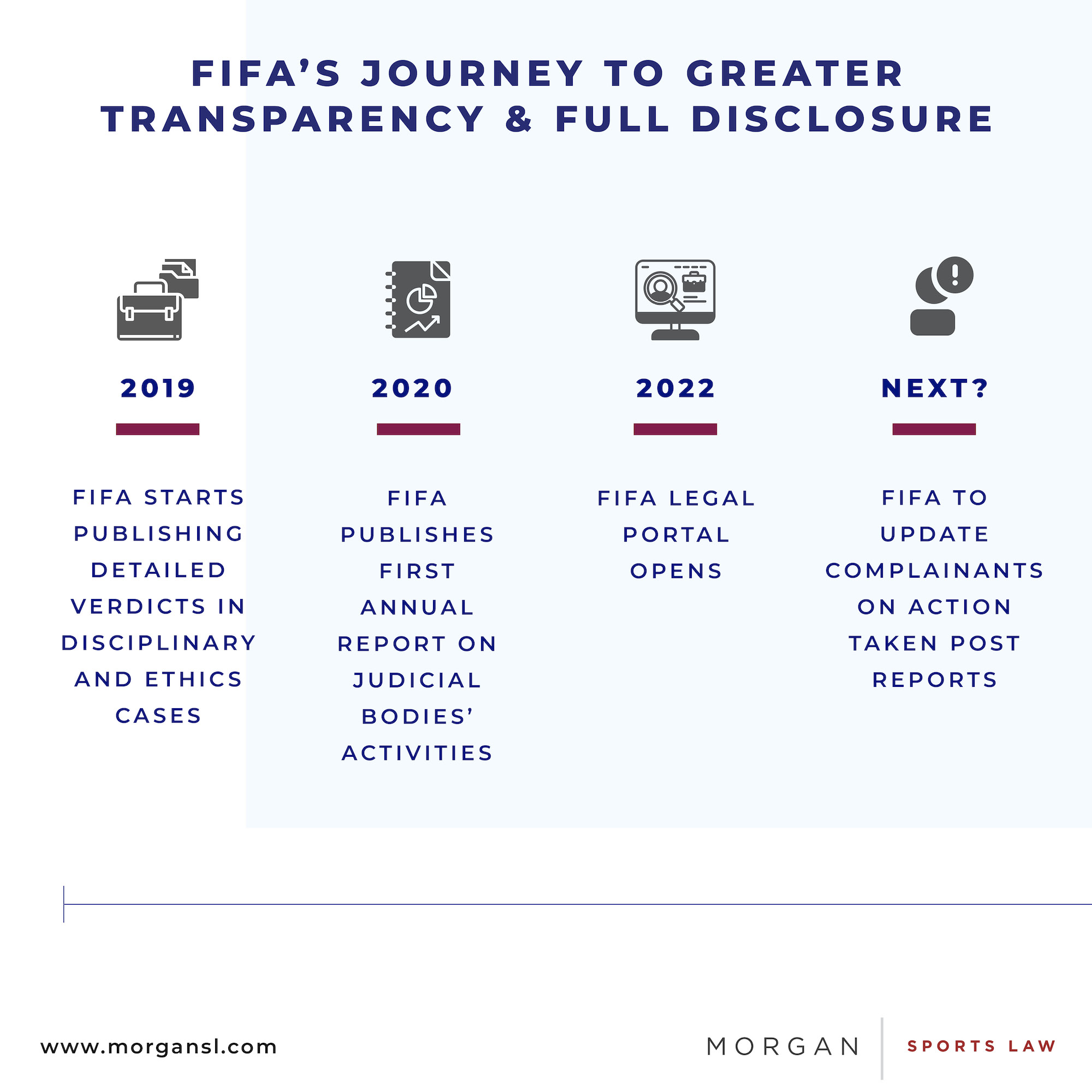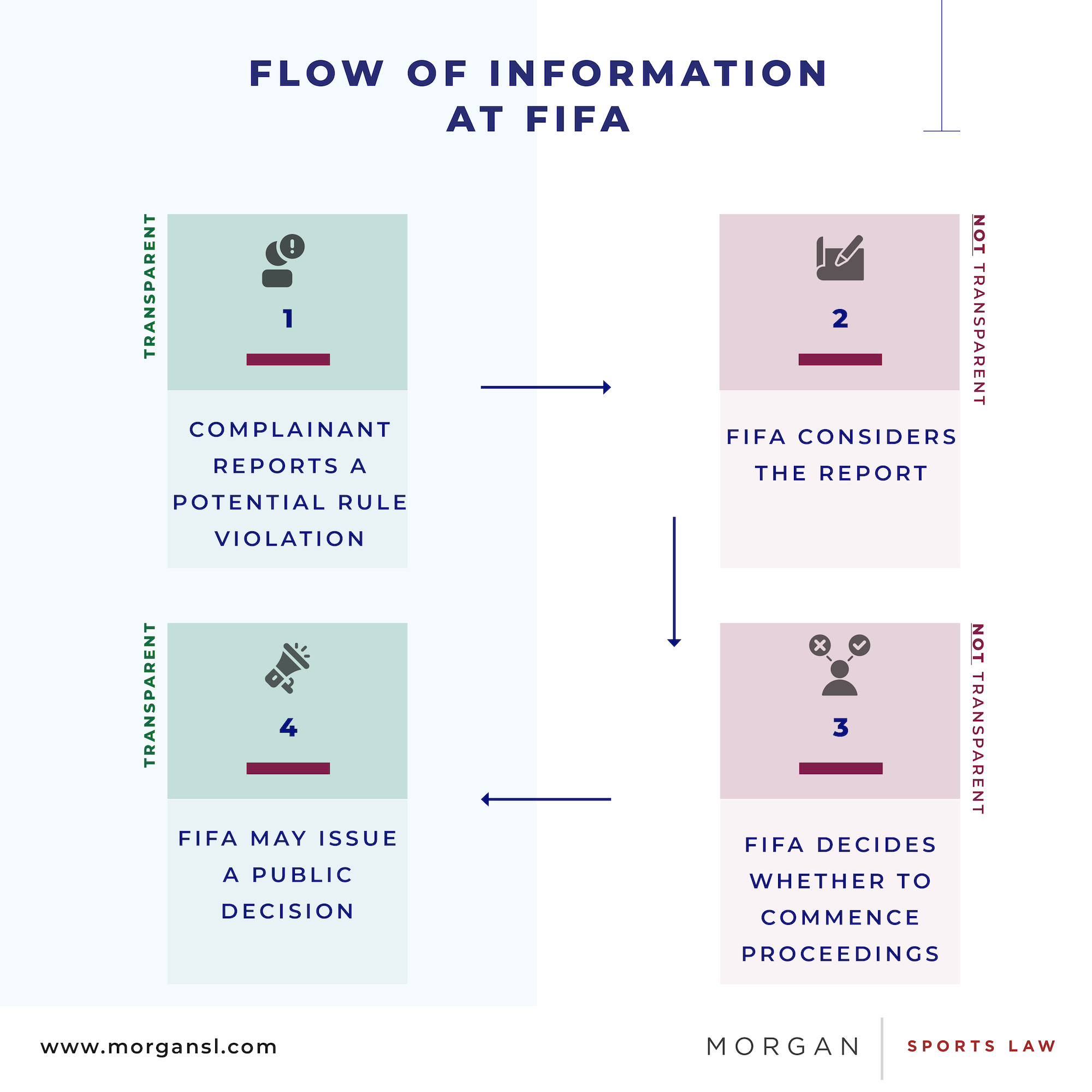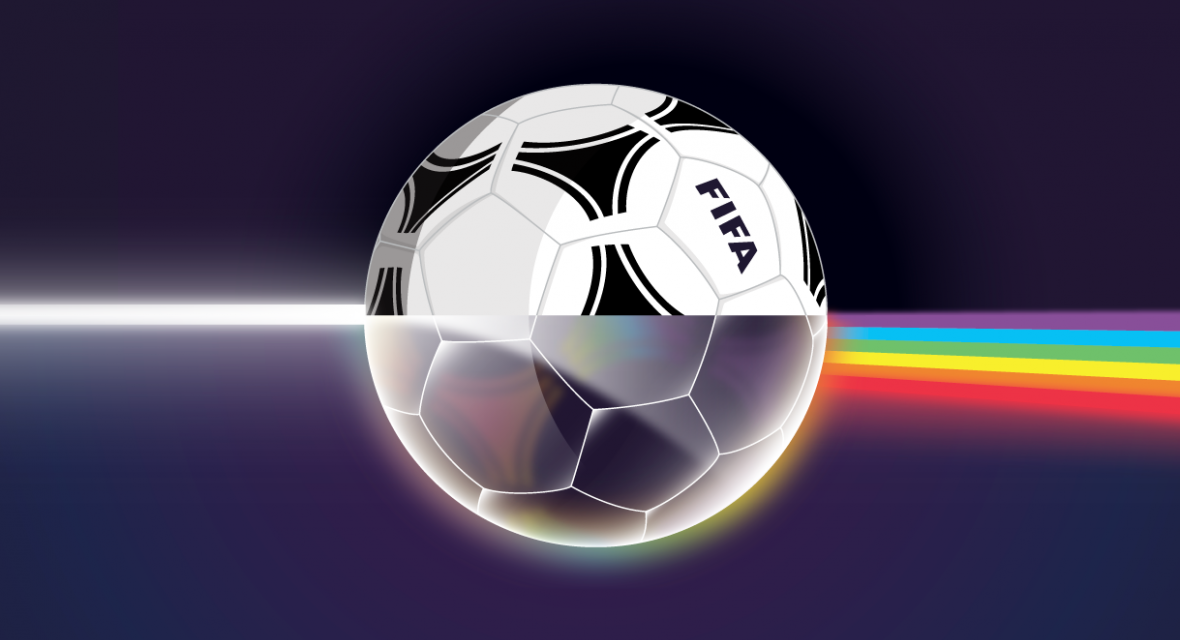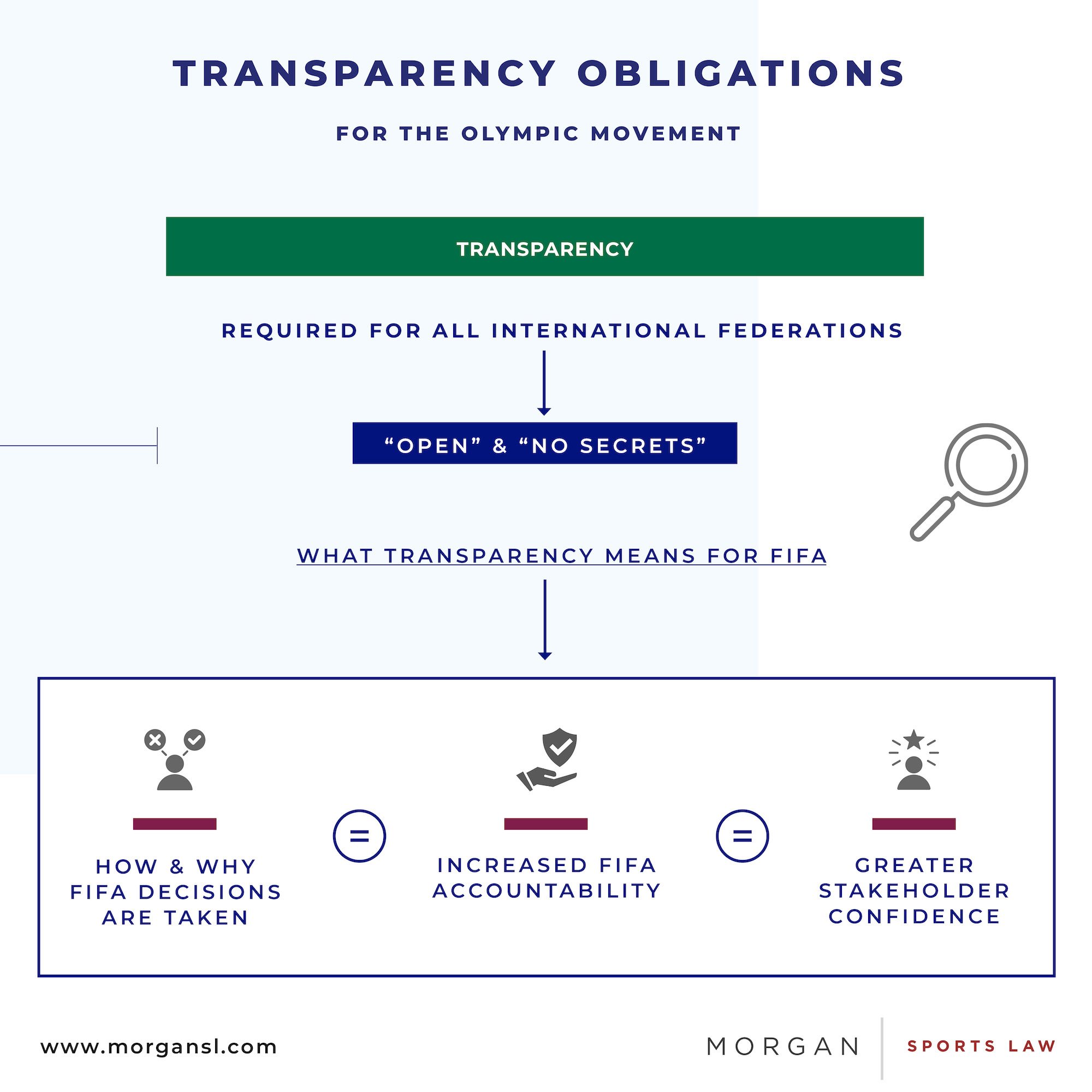Is FIFA as transparent as it says it is?
Anyone involved in professional football is obliged to report potential breaches of the FIFA Disciplinary Code (the “FDC”) to FIFA. However, in our experience, those who do report potential rule violations receive no information from FIFA about the status of their report. As such, they are deprived of any assurance that their report has been properly investigated and whether, depending on the outcome of the relevant investigation, disciplinary proceedings have been initiated and conducted as a result of their report.
This lack of transparency is dangerous for a major international sports federation such as FIFA (particularly one that has previously been tainted by corruption). It leaves the door open for rule violations to be brushed aside without proper investigation and action.
In this article, we explore the opaqueness of FIFA’s disciplinary procedures and suggest how FIFA should improve its policies to be more transparent.
What is transparency and why is it important?
As part of the Olympic Movement, FIFA is obliged to be “transparent”. This is one of the key principles under the Basic Universal Principles of Good Governance of the Olympic and Sports Movement.
Transparency is defined as “a situation in which business and financial activities are done in an open way without secrets, so that people can trust that they are fair and honest”.
It is important for international federations to be transparent about how and why they make decisions. Such transparency allows federations’ stakeholders, as well as the wider public, to understand and have confidence in their processes and to hold them accountable for their decisions.
Is FIFA transparent?
FIFA is very vocal about its commitment to “the principles of the rule of law, good governance and transparency”. Over the last four years, it has brought in various initiatives to ensure “transparency and traceability” surrounding the activities of its judicial bodies (the Disciplinary, Appeal and Ethics Committees). For example:
-
In 2019, FIFA started to publish detailed verdicts in disciplinary and ethics cases – to quieten “suspicion and conspiracy theories” about how decisions were taken.
-
In 2020, FIFA published its first annual report on the activities of its judicial bodies – “[i]n a further step towards greater transparency and full disclosure of fundamental activities and operations” and with the aim of “positioning FIFA at the forefront of international federations regarding the transparency of its legal proceedings and internal mechanisms”.
-
In 2022, FIFA opened its Legal Portal – an online platform used for filing claims, exchanging communications and documents, and issuing decisions in FIFA regulatory proceedings – with the aim of ensuring “transparent communication”, “a better understanding of proceedings” and “heightened traceability”.
-
In 2023, upon publishing its fourth annual report on the activities of its judicial bodies, FIFA spoke of its “continued efforts to promote transparency and full disclosure in relation to [its judicial bodies’] activities” and its “objectives of increasing transparency and maintaining the distinguished standards that have been fostered and upheld in recent years by FIFA’s judicial bodies”.

Although FIFA is already much more transparent about its judicial activities than many other international federations, some gaps do remain.
Where are the gaps?
A person who reports a potential rule violation to FIFA can reasonably expect their complaint to be investigated and, if appropriate, proceedings to be opened. It is therefore vital for FIFA to inform complainants how their report has been handled and to provide adequate justification for any decision made, to satisfy them that proper action has been taken (even if FIFA ultimately decides not to initiate proceedings). This is particularly important in circumstances where the FDC only states that FIFA “may initiate investigations” into rule violation complaints (meaning that there is no guarantee that reports are even investigated).
However, in FIFA disciplinary proceedings, non-parties (such as the person who reports the violation) do not currently have an automatic right to information. The FDC states “[t]he opening of proceedings … may be made public by FIFA”. It is perfectly comprehensible that not every potential rule violation is of public interest, but it regularly is of interest for the complainant, in particular, in relation to proceedings pertaining to the respect of decisions (art. 21 of the FDC). However, in our experience, such information is not generally communicated to the complainant (without being made public)– even on request. FIFA does not confirm whether a complaint has been investigated, let alone if formal proceedings have been opened or what the status of such proceedings is. This means that the complainant will only discover the outcome of their report once a final decision is published on FIFA’s website – assuming formal proceedings are opened.

This article does not contest that FIFA is conducting proper investigations or taking reasoned decisions about whether to open disciplinary proceedings. However, without being open and transparent with those who file reports, there is no way for FIFA’s stakeholders to scrutinise its processes. Complainants therefore cannot trust that proper processes are being followed, and there is no way to hold FIFA to account for wrong decisions.
This is unlike in criminal proceedings where, in Switzerland, England and other jurisdictions, victims (i.e. those who report the offence) have the right to be informed of various details, including the current status of proceedings and any penalty ultimately imposed. These rights exist to provide reassurance that the offence is being taken seriously and to empower the victim to hold the system to account if it is not.
How can a complainant currently get information?
As mentioned, in our experience, FIFA does not provide any update on disciplinary proceedings to complainants who are not a party. Therefore, the only option for a complainant to obtain information would be to appeal to the Court of Arbitration for Sport against FIFA’s refusal to provide information. This would be a costly, lengthy and, in truth, rather longwinded attempt to obtain information which FIFA could provide quickly and easily.
How could FIFA be more transparent?
It is our opinion that FIFA should always inform the complainant of the opening, status and outcome of proceedings (along with brief reasons for any decisions made). If there are compelling reasons not to provide updates (for example, if doing so would hamper the investigation), FIFA should explain why.
Demands for greater transparency from FIFA are widespread. Between 1 July 2022 and 30 June 2023, the FIFA Disciplinary Committee received up to 158 requests for information related to disciplinary matters and/or matters that fell within the scope of the FDC. The year before, up to 155 such requests were made.
Requiring FIFA to supply updates on disciplinary investigations and proceedings to those who report rule violations would provide more of the “transparency and traceability” that FIFA strives for, instill confidence that it is acting responsibly, and allow it to be held to account if its decisions are not justified.
Conclusion
FIFA has improved its transparency by leaps and bounds over the last four years. However, improvements can still be made.
Keeping those who report breaches of the rules to FIFA updated on whether disciplinary proceedings have been opened (and, if not, why not) is the logical next step.
Authored by
William Sternheimer
Partner
Ellen Kerr
Associate
Marko Lavs
Paralegal



